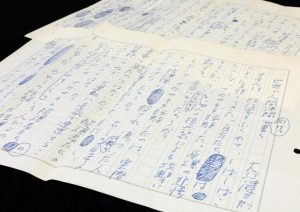Novelist Kenzaburo Oe’s handwritten document sent to Nihon Hidankyo in 1989 reveals solidarity with A-bomb survivors, describes each experience as “universal”
Aug. 2, 2023
by Masaharu Nakagawa, Staff Writer
Traces have been discovered of 30 revisions made by Kenzaburo Oe, a novelist and a recipient of the Nobel Prize in Literature who died earlier in March this year at the age of 88, to a document he had sent to the Japan Confederation of A-and H-Bomb Sufferers Organizations (Nihon Hidankyo) in 1989. Mr. Oe’s revisions provide a sense of how he carefully selected appropriate wording based on his effort to empathize with A-bomb survivors. He regarded A-bombing experiences as “universal” and described each as being “a voice that speaks to the soul of all of humanity existing under the tyranny of nuclear weapons.”
The document is the original manuscript of an article Mr. Oe contributed to a newsletter published by Nihon Hidankyo in November 1989. According to the postmark found on an envelope, the document is assumed to have been sent in August of that year. The manuscript had been archived by the Tokyo-based, non-profit organization No More Hibakusha Project, a group involved in the collection and communication of records of the campaigns the A-bomb survivors have waged to abolish nuclear weapons, at its storage facility in Saitama City.
His writing, on two sheets of B4-size paper, is titled “To all fellow humans around the world.” To the Japanese public, including politicians who assert their understanding of the horrors of the atomic bombing, he wrote, “I suspect that ordinary Japanese people have rather isolated, discriminated against, or even abandoned the A-bomb survivors.” To the initial draft, Mr. Oe added the word “even,” revealing the anger he felt at the reality of slow progress in efforts to provide aid to the survivors.
As for the suffering caused by the aging and isolation experienced by A-bomb survivors, his revision added the adjective “significant” to the document. Mr. Oe revealed an attitude of respect for the testimonies of A-bomb survivors by inserting the phrase “as they are” to the description of A-bomb survivors’ experiences as being “universal expressions as they are.”
He concluded by writing that people to whom the voices of A-bomb survivors should be communicated “are individuals in the world, true fellow human beings, who have been placed under a nuclear regime but refuse to die because of it.” He rewrote this single sentence in a total of seven places, including the phrase “in the world.” With that, he emphasized the importance of communicating to the international community the hopes of A-bomb survivors.
Jiro Hamasumi, 77, assistant secretary-general of the group who is a resident of Inagi City in Tokyo, experienced the atomic bombing while in his pregnant mother’s womb. Mr. Hamasumi said, “The many revisions show Mr. Oe’s thoughtful support of the A-bomb survivors’ movement.” Mr. Hamasumi once again views the content of Mr. Oe’s writing as being “a significant message that resonates with people in the present day.”
(Originally published on August 2, 2023)
Traces have been discovered of 30 revisions made by Kenzaburo Oe, a novelist and a recipient of the Nobel Prize in Literature who died earlier in March this year at the age of 88, to a document he had sent to the Japan Confederation of A-and H-Bomb Sufferers Organizations (Nihon Hidankyo) in 1989. Mr. Oe’s revisions provide a sense of how he carefully selected appropriate wording based on his effort to empathize with A-bomb survivors. He regarded A-bombing experiences as “universal” and described each as being “a voice that speaks to the soul of all of humanity existing under the tyranny of nuclear weapons.”
The document is the original manuscript of an article Mr. Oe contributed to a newsletter published by Nihon Hidankyo in November 1989. According to the postmark found on an envelope, the document is assumed to have been sent in August of that year. The manuscript had been archived by the Tokyo-based, non-profit organization No More Hibakusha Project, a group involved in the collection and communication of records of the campaigns the A-bomb survivors have waged to abolish nuclear weapons, at its storage facility in Saitama City.
His writing, on two sheets of B4-size paper, is titled “To all fellow humans around the world.” To the Japanese public, including politicians who assert their understanding of the horrors of the atomic bombing, he wrote, “I suspect that ordinary Japanese people have rather isolated, discriminated against, or even abandoned the A-bomb survivors.” To the initial draft, Mr. Oe added the word “even,” revealing the anger he felt at the reality of slow progress in efforts to provide aid to the survivors.
As for the suffering caused by the aging and isolation experienced by A-bomb survivors, his revision added the adjective “significant” to the document. Mr. Oe revealed an attitude of respect for the testimonies of A-bomb survivors by inserting the phrase “as they are” to the description of A-bomb survivors’ experiences as being “universal expressions as they are.”
He concluded by writing that people to whom the voices of A-bomb survivors should be communicated “are individuals in the world, true fellow human beings, who have been placed under a nuclear regime but refuse to die because of it.” He rewrote this single sentence in a total of seven places, including the phrase “in the world.” With that, he emphasized the importance of communicating to the international community the hopes of A-bomb survivors.
Jiro Hamasumi, 77, assistant secretary-general of the group who is a resident of Inagi City in Tokyo, experienced the atomic bombing while in his pregnant mother’s womb. Mr. Hamasumi said, “The many revisions show Mr. Oe’s thoughtful support of the A-bomb survivors’ movement.” Mr. Hamasumi once again views the content of Mr. Oe’s writing as being “a significant message that resonates with people in the present day.”
(Originally published on August 2, 2023)








